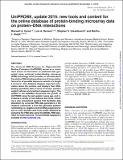UniPROBE, update 2015: new tools and content for the online database of protein-binding microarray data on protein-DNA interactions
Author(s)
Barrera, Luis Alberto; Bulyk, Martha L.; Hume, Maxwell A.; Gisselbrecht, Stephen S.
DownloadHume-2014-UniPROBE, update 201.pdf (1.258Mb)
PUBLISHER_CC
Publisher with Creative Commons License
Creative Commons Attribution
Terms of use
Metadata
Show full item recordAbstract
The Universal PBM Resource for Oligonucleotide Binding Evaluation (UniPROBE) serves as a convenient source of information on published data generated using universal protein-binding microarray (PBM) technology, which provides in vitro data about the relative DNA-binding preferences of transcription factors for all possible sequence variants of a length k (‘k-mers’). The database displays important information about the proteins and displays their DNA-binding specificity data in terms of k-mers, position weight matrices and graphical sequence logos. This update to the database documents the growth of UniPROBE since the last update 4 years ago, and introduces a variety of new features and tools, including a new streamlined pipeline that facilitates data deposition by universal PBM data generators in the research community, a tool that generates putative nonbinding (i.e. negative control) DNA sequences for one or more proteins and novel motifs obtained by analyzing the PBM data using the BEEML-PBM algorithm for motif inference. The UniPROBE database is available at http://uniprobe.org.
Date issued
2014-11Department
Harvard University--MIT Division of Health Sciences and TechnologyJournal
Nucleic Acids Research
Publisher
Oxford University Press
Citation
Hume, Maxwell A., Luis A. Barrera, Stephen S. Gisselbrecht, and Martha L. Bulyk. “UniPROBE, Update 2015: New Tools and Content for the Online Database of Protein-Binding Microarray Data on Protein-DNA Interactions.” Nucleic Acids Research (November 5, 2014).
Version: Final published version
ISSN
0305-1048
1362-4962